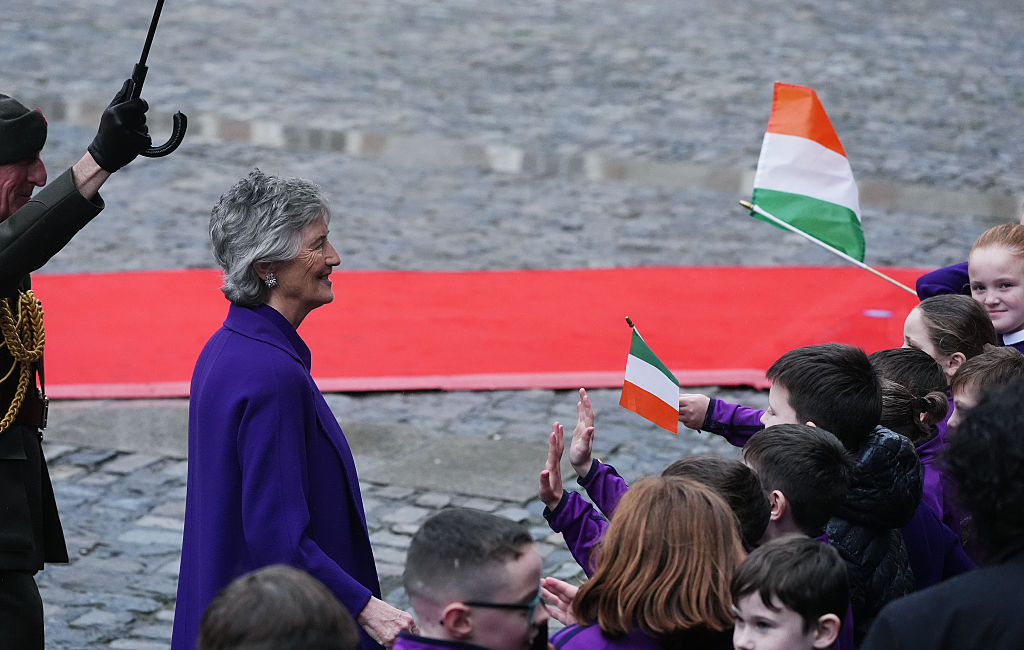Ireland has a new left-wing President. Catherine Connolly was sworn in on Tuesday with a pledge to be a catalyst for change, resist militarization, and work toward a United Ireland—potentially putting her at odds with Ireland’s own government, and its allies in Europe and America.
Domestically, Connolly is something of an electoral novelty. Ireland’s taoisigh (Prime Ministers) have come only from Fianna Fáil or Fine Gael, centre-right parties whose differences are historical and whose modern outlooks are interchangeable. Connolly’s campaign united Ireland’s left and centre-left parties in a rebuke of the status quo. The next general election may still be four years away, but for those who want more radical change, Connolly’s victory is proof of concept.
[time-brightcove not-tgx=”true”]
Their cause will be encouraged by the margin of victory: in a three-way race, Connolly took 63% of the vote—winning more votes than any candidate in Irish electoral history, despite poor turnout.
Of more short-term, and international, consequence is the stance taken by Ireland’s new President on global affairs.
The Irish presidency is head of state, but their primary duties are limited to signing legislation and making public appointments. The majority of the President’s functions are performed on the advice of the government, making it a largely ceremonial role.
Yet successive Presidents have pushed these boundaries. Mary Robinson, elected in 1990, stimulated higher levels of national spending on overseas aid through high-profile visits to famine-ravaged Africa. The election of Mary McAleese in 1997, the first time a President had come from Northern Ireland, officially part of the U.K., added momentum to the peace talks that yielded the Good Friday Agreement in 1998, and helped heal the wounds of 30 years of armed conflict between loyalist and republican paramilitaries. Michael D. Higgins, Connolly’s predecessor, pushed the envelope further—giving voice not just to top domestic concerns like a chronic shortage of housing, but on Ireland’s discomfort with the unfolding humanitarian catastrophe in Gaza.
A question that arises now, as Connolly settles into her new role, is whether she will look to further stretch the boundaries of presidential interventions—and the impact this could have on Ireland’s international relations.
In supporting the Palestinian cause, Ireland sees echoes of its own history, sympathizing with a like-minded quest of unfinished nationhood. Elsewhere, however, this is often construed as opposition to Israel or outright antisemitism.
This perception is rife in the U.S., where Ireland has already been perceived as something of a freeloader. President Trump has vowed to win back the pharma and tech giants like Pfizer, Eli Lilly, Intel, and Apple who have made low-tax Ireland their European home, and who have yielded astonishing levels of corporate tax receipts for a country of just 5.5 million. Meanwhile, Trump’s hawkish advisors, and others in an increasingly militarized Europe, see Ireland—military neutral itself, with NATO for neighbors—as benefiting from the defense spending of others.
Irish support for Palestine culminated in unilaterally recognizing Palestinian statehood in 2024, prompting the withdrawal of Israel’s ambassador in Dublin, and claims that Ireland had rewarded the Oct. 7 Hamas attack. Ireland has also led a push to suspend the E.U.’s free trade arrangements with Israel, and is pursuing domestic laws to ban imports from illegal Israeli settlements in the West Bank—two campaigns that have met with a chilly reception in Washington. Having cultivated strong links with the Democrats, including the Irish American Joe Biden, Dublin now finds itself without its usual friendly audience—and, increasingly, without a common cause.
That is a low-level diplomatic crisis that Ireland’s envoys have been working hard to amend—work which could, potentially, conflict with the comments of their new President. Earlier this year, in a parliamentary debate on the invasion of Ukraine, Connolly said Russia was not the only untrustworthy global actor: “America is one of those,” she said, “and England and France are others.” The new President has also criticized the E.U.—which enjoys broad public support, and whose rotating presidency Ireland assumes next July—over its “militarization.”
Connolly’s comments about the U.K. might be one reason why the Democratic Unionist Party, the largest pro-British faction in Northern Ireland, did not send an envoy to her inauguration. Her stance on a United Ireland is another: during the campaign, she sought a date for holding a referendum on unity. This is a stronger position than any Irish government in decades.
On one hand, Connolly is bound by the constraints of the presidency. On the other, she is compelled by an overwhelming electoral win. In her inaugural address at Dublin Castle, she spoke with the same level of candor as a President as she did as a candidate—citing her “powerful mandate to articulate [her voters’] vision for a new Republic,” and declaring that “the normalization of war and genocide has never been and will never be acceptable” to Ireland, a country with its own history of “catastrophic manmade famine and forced emigration.”
The broader Irish public would find little to disagree with in those remarks. Observers overseas may disagree—and that, in itself, is a tension worth watching.

